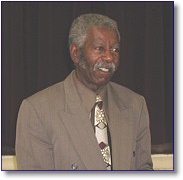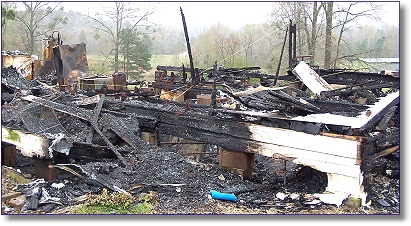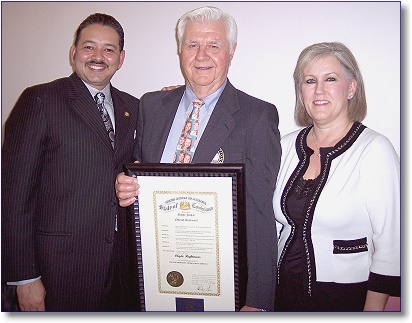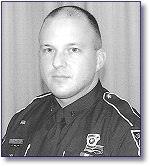Harsh feelings, change tops forum
MICHELLE BATES, Editor
The
black community in Homer expressed some hard feelings towards the police force
in a community forum held Friday, March 13, as well as a desire for change in
the community.
Since
the shooting death of Bernard Monroe Sr., 73, by a Homer police officer,
members of the community have expressed fury over the alleged harsh treatment
by police. The majority of the citizens who attended the forum were from the Pearl Street and Buck Bottom areas of Homer.
The
National Association for the Advancement of Colored People (NAACP) has launched
its own investigation surrounding the circumstances of Monroe’s death and the
Federal Bureau of Investigation (FBI) has begun its own inquiry into Monroe’s alleged civil rights violations. In addition, the U.S. Justice Department has
sent in a team to help keep the peace among community members while the state
police investigation moves forward.
Monroe was shot and killed in his front yard by a Homer police
officer on Friday, February 20, after two officers pursued Monroe’s son, Sean,
to the residence. According to State Police, Monroe allegedly pointed a gun at
the other officer, resulting in the elderly man’s death.
Many
shared feelings of anger, saying police are too “gung ho” in their efforts to
quell crime in their neighborhoods.
Benny
Holyfield said that he is concerned with the department’s unprofessional
contact with citizens, referring to alleged use of excessive force and slow
response time to fires and burglaries in the black community.
Although
many expressed their contempt of the Homer Police Department, just as many
expressed their wishes for a change in the community.
“We
need change,” said Homer resident Clifton Mozeke. “Why is there such separation
between black and white when we serve one God? It’s always a black/white issue.
Why? It’s not a black/white issue. I’m sick of this. Homer is my home; I love
Homer.”
Homer
citizen Xanthia Seales said all residents have a right to mutual respect.
“They
(police officers) respect who they THINK you are,” said Seales. “The police
should treat us more like people.”
The
forum was held to a strict schedule, allowing everyone to have their say, but
in a constructive manner. Carmelita Pope Freeman of the Community Relations
Service branch of the U.S. Justice Department set up ground rules and said no
one would be allowed to “point fingers.” She explained that once everyone had a
chance to talk, she would reframe the comments into something to “work with.”
Mike Campbell, law enforcement
coordinator for the U.S. Attorney’s Office, spoke briefly, saying that much has
been accomplished in situations such as this. He referred to a similar incident
in Shreveport where an officer shot and killed Marquis Hudspeth. The officer in
that situation acted after he saw Hudspeth wield what he thought was a gun. The
object turned out to be a cell phone.
“I know
it’s very tough for a community, because I became chief in the aftermath of the
Marquis Hudspeth shooting,” he said to those in attendance. “I can tell you this,
that working with Ms. Freeman, we were able to accomplish a lot of great things
in Shreveport. We did that through opening the lines of communication.”
Freeman said there are ways to
address this issue as well as other needs and concerns.
“We are
here to facilitate and provide technical assistance to help this town to
address what it needs, what it has expressed or it has talked about,” said
Freeman.
In
discussing the outcome of the assessment meeting held March 2 at New Hope Missionary Baptist Church, Freeman said everybody — law enforcement and citizens —
have feelings about the issue.
Homer
Police Chief Russell Mills sat quietly and listened intently as citizens voiced
their grievances with his department. In a separate interview, Mills responded,
making it clear that he wants what the community wants – cooperation and
communication.
“I’m
glad that we’re talking,” he said. “Everybody may not have the same (ideas),
but we’re talking. I’m willing to work with anybody, but we all need to get on
the same page.
“I felt
like (the forum) was necessary to enable some of the community to voice their
opinions,” Mills continued. “I was disappointed on some of the issues. I was
disgusted with some of the statements. I was surprised at some of the things
said.”
He is
expected to meet with Freeman this week to discuss the community forum and felt
it premature to make any further comments on the issue until that meeting could
take place.
Homer
Mayor David Newell said he wants what’s best for his town and this forum was a
good beginning to opening the lines of communication so the healing process
could begin.
Monroe’s death has been under severe scrutiny since the day it
happened and news organizations from across the country have taken interest,
which seems to be fueling the fire of an already volatile situation.
CNN
reported live from Homer City Hall Friday evening during the forum. The news
stations from Shreveport also converged on Homer to cover the event.
Homer councilman passes away
The Guardian-Journal
Homer’s
longest-standing councilman has passed away.
 District
1 Councilman J.C. Moore, 67, passed away Sunday, March 15, after suffering a
stroke Thursday, March 5.
District
1 Councilman J.C. Moore, 67, passed away Sunday, March 15, after suffering a
stroke Thursday, March 5.
Funeral
arrangements have been set for 2:30 p.m. Saturday, March 21, at Homer High School in the auditorium. The wake for family and friends will be held from 6
until 8 p.m. at Mt. Dillard CME Church in Homer. The church is located on Hwy.
9
According
to town records, Moore, who served as mayor pro tempore for many years, was the
only elected official in town to serve as many years on the council. The son of
the late John S. and Eula Rabb Moore, J.C. was born October 28, 1941. An Army veteran, Moore received a Purple Heart after sustaining injuries while
serving in Vietnam from 1966-67. As a member of Mt. Dillard CME Church, he served and supported its varied programs, projects and ministries. He was also a
member of Succoth Lodge #88 where he served as Worshipful Master.
He was
the office manager at King’s Funeral Home in Homer.
Homer
Mayor David Newell expressed his sadness in regards to the loss of Moore.
“It’s
very sad times for the town,” he said. “Mr. J.C. was a soldier who served the United States and he served this town. I and the Town of Homer honor the sacrifices he made
for his country and his town. We will keep his family in our prayers, and we
will miss him.”
And
although Moore will be greatly missed by family, friends and his community, the
business of filling the District 1 seat will have to take place. With big shoes
to fill, Newell will have to call an election by giving 10 days notice. That
means the town will have to run a public advertisement, and once the returns
come back, they won’t go to the Louisiana Secretary of State, but to Newell.
Most
municipalities would appoint someone to fill the vacancy, but because Homer is
under a special legislative charter, the process is different.
“When a
vacancy occurs in the office of any selectman, the mayor shall order an
election to fill said vacancy by giving 10 days notice, thereof, by public advertisement,
which shall be conducted in the same manner except that the returns shall be
made to the mayor,” states Section 2 of the Municipal Code.
Portions
of this story courtesy of Byron McCauley of Grambling State University.
Fire destroys Summerfield home

The Guardian-Journal photo/Jenni Williams
Not much remains of this home perched
atop a hill overlooking the horse pastures and pond. The home was a complete
loss after passersby noticed the smoke in the Summerfield area.
JENNI WILLIAMS, The Guardian-Journal
Last
Wednesday night, while the family was away for the evening, the home above was
fully engulfed in flames by the time passersby noticed the smoke above the
treetops. In such a rural area, the chances of anyone seeing the fire before it
had spead past the house to the barns and pastures was simply a miracle.
After
desperate attempts by the volunteer fire departments from Summerfield and Lisbon, it was obvious that there was no hope for the wood-framed house located at the
end of Reynolds Road in Summerfield.
Chad and Mandy Verdin, along with six-year-old Daisy, were
thankfully not at home at the time, but the three dogs, cat and pet bird were
caught inside with no way out.
Unfortunately,
the fire had burned so long and so hot that nothing but a south facing wall and
several pieces of furniture were all that were remaining by the time the fire
departments arrived on scene. These were quickly gone, too.
Fire
and insurance investigators have been unable to determine the origin of the
fire due to the absolute devastation caused by the flames.
The
family has been unable to salvage anything from the rubble and are currently
staying with friends in the area so that Daisy can continue to attend first
grade at Summerfield High School.
Friends,
family and complete strangers are coming to the aid of the family. Clothing
drives, toy drives and all household goods are being accepted at the school,
where Mandy is an employee and bus driver.
The
girls’ softball team at Summerfield is hosting a toy drive to help ease the
burden of a six-year-old left with nothing but the clothes on her back and her
school backpack.
An
account has been opened at First Guaranty Bank in Homer under the names Chad and Mandy Verdin, for any individuals wanting to make donations at this time.
What do eggs and bunnies have to do with
Easter?
JENNI WILLIAMS, The Guardian-Journal
As
with almost all "Christian" holidays, Easter has been secularized and
commercialized.
The
dichotomous nature of Easter and its symbols, however, is not necessarily a
modern fabrication.
Since
its beginning as a holy celebration in the second century, Easter has had its
non-religious side. In fact, Easter was originally a pagan festival.
The
ancient Saxons celebrated the return of spring with a festival commemorating
their goddess of offspring and of springtime, Eastre. When the second-century
Christian missionaries encountered the tribes of the north with their pagan
celebrations, they attempted to convert them to Christianity.
They
did so, however, in a clandestine manner.
It
would have been suicide for the very early Christian converts to celebrate
their holy days with observances that did not coincide with celebrations that
already existed.
To save
lives, the missionaries cleverly decided to spread their religious message
slowly throughout the populations by allowing them to continue to celebrate
pagan feasts, but to do so in a Christian manner.
As it
happened, the pagan festival of Eastre occurred at the same time of year as the
Christian observance of the Resurrection of Christ. Therefore, it made sense to
alter the festival itself, to make it a Christian celebration as converts were
slowly won over. The early name, Eastre, was eventually changed to its modern
spelling, Easter.
The
Easter Bunny is not a modern invention either. The symbol began with the pagan
festival of Eastre. The goddess, Eastre, was worshipped by the Anglo-Saxons
through her earthly symbol, the rabbit, which now brings the Easter Bunny.
The Germans
brought the symbol of the Easter rabbit to America. It was widely ignored by
other Christians until shortly after the Civil War. In fact, Easter itself was
not widely celebrated in America until after that time.
As with
the Easter Bunny and the holiday itself, the Easter Egg predates the Christian
holiday of Easter. The exchange of eggs in the springtime is a custom that was
centuries old when Easter was first celebrated by Christians.
From
the earliest times, the egg was a symbol of rebirth in most cultures. Eggs were
often wrapped in gold leaf or, if a peasant, colored brightly by boiling them
with the leaves or petals of certain flowers.
Different
cultures have developed their own ways of decorating Easter eggs. Crimson eggs,
to honor the blood of Christ, are exchanged in Greece. In parts of Germany and Austria green eggs are used on Maundy Thursday (Holy Thursday). Slavic
peoples decorate their eggs in special patterns of gold and silver.
The
Germans expanded this tradition of coloring eggs into the Easter egg basket,
delivered by a hopping bunny.
Today,
children hunt colored eggs and place them in Easter baskets along with the
modern version of real Easter eggs -- those made of plastic or chocolate candy.

Lisa Reeder, second from left, of
Haynesville, was winner of the 2009 Chevy Traverse given away during the recent
Good Neighbor Chevy Mardi Gras contest. She was accompanied to the drawing by
her husband Kerry, and two sons Trent and Colton. Also, on hand for the grand
prize drawing were John Synco of Synco Motors Inc., far left, one of the Good
Neighbor Chevy Dealers, and George Fritze, of Red River Chevrolet, right,
president of the dealer group. The grand prize drawing was March 12. Reeder was
the tenth and final person to given a key for a chance to open the door of the
door of the vehicle. Reeder registered for the chance to win at Synco Motors
Inc.
Scissors land man behind bars
The Guardian-Journal
A pair
of scissors has landed a Homer man in jail.
Jamarcus
Hunter, 20, was charged with domestic abuse batter and aggravated assault. Bond
on both charges was set at $2,000 each, bringing the total to $4,000.
According
to police reports, the victim in the incident told Hunter to leave her
residence, but he did not. Later that day, Hunter found the victim at another
residence at which time he entered the residence and allegedly attacked the
victim with a pair of scissors.
At that
time, the arrest was made and he was transported to the Claiborne Parish Detention Center.
Investigating,
arresting officers were Police Chief Russell Mills and Officer J.D. Faulkner.
In an
unrelated case, Tristan Neal, 25, was arrested Saturday, March 14, and charged
with illegal use of weapons/dangerous instrumentalities, with bond set at $2,000;
and resisting an officer, with bond set at $500.
Reports
say that Homer Police was dispatched to a residence on Monroe Street in
reference to shots fired.
Upon
arrival, officers spoke with someone who denied knowing who fired the shots. At
that time, officers located two unspent rounds and one casing in the front yard
of another residence on Monroe Street.
Officers
were given Neal’s name, and earlier, police had observed a vehicle leaving the
residence in question. Officers Van McDaniel and John Bailey stopped that
vehicle identifying Neal inside.
When
asked if he had a gun inside the car, he said no. A search of the vehicle
revealed a gun inside and the same type of ammunition found at the scene. After
a struggle, Neal was taken into custody and booked.
Homer Police: ‘You have to prove it’s
yours’
The Guardian-Journal
With a
rash of burglaries occurring over the last several months, items recovered from
these cases are piling up.
The
Homer Police Department is asking citizens to make sure that any items with
serial numbers in their homes are documented and put in a safe place –
especially guns.
“Jot
down the serial numbers of the guns you own,” Officer J.D. Faulkner said,
“because if you have a gun stolen, you have to prove it’s yours.”
Unless
police can prove it belongs to its rightful owner, these items cannot be
released.
Even if
the serial numbers on the gun have been obliterated, it’s useful to have it
written down somewhere safe so that the owner will know it’s theirs. A crime
lab can use chemicals to possibly read through the scratches.
Another
suggestion Faulkner made is to put an identifying mark on the gun in an
inconspicuous spot where the owner can identify it as his/hers.
“It’s
like anything you have around the house that can be stolen – TVs, DVD players,
Play Stations – they all have serial numbers on them,” Police Chief Russell
Mills said. “Write them down.”
Insurance
companies tell customers on a regular basis to write down serial numbers on all
electronics or items of value so that if it’s stolen and recovered, it can be
returned to its rightful owner.
Most
insurance companies offer pamphlets where customers can write down all those
numbers in one place and it’s small enough to store with important paperwork.
State
Farm’s website includes various ways for people to document what they own. One
tip they offer is to record the dates items are purchased as well as what was
paid for them. It would also be a good idea to keep all sales receipts and
attach it to the inventory list.
Some
“theft-prone” items include collectibles; antiques; art objects; figurines;
guns; paintings; clocks; silver; jewelry; furs; electrical appliances; lawn
mowers; power tools; sewing machines; vacuum cleaners; electronic equipment;
computers; digital cameras; printers; scanners; fax machine; stereos and MP3
players; televisions; video cameras; DVD players; CDs and DVDs; musical
instruments; photography equipment; and sports equipment.
Jindal recognizes former tax assessor

The Guardian-Journal photo/Michelle Bates
Former Claiborne Parish Tax Assessor Clyde Hightower, center, received a proclamation from Gov. Bobby Jindal in recognition of
his service. Susan Emerson, pictured right, presented the proclamation.
Pictured left is Rep. Rick Gallot.
Severance Tax Proposal
Language changed in proposed bill
MICHELLE BATES, Editor
Since
the defeat of Proposed Amendment #4 on the severance tax cap, District 11 Rep.
Rick Gallot, D-Ruston, and his team have worked diligently to change the language
of the bill.
“We’ve
basically reversed the language so that instead of it reading ‘an increase in
severance tax cap for parishes,’ it will read ‘a decrease of severance tax
collected by the state,’” Gallot said. “That was the same effect it would have
had the last time – more money to the parishes, less money to the state.”
This
legislative bill is asking voters for an increase in the severance tax cap from
$850,000 to $2.85 million. This bill, if passed by Louisiana voters, will mean
that oil and gas producing parishes will get back approximately $1.2 million
more from the state to spend on roads and parish infrastructure.
Currently,
Claiborne Parish brings in approximately $14-15 million in tax revenue on oil
and gas, according to police jury records, and most of that is going into the
state’s general fund to be spent as the state sees fit. If passed, $2.85
million of that $14-15 million would come back to Claiborne Parish.
In
November 2008, Proposed Amendment #4 was one of seven on the ballot, but it
failed by a large degree. Although the amendment passed by 70 percent in
Claiborne Parish, voters in other parishes didn’t quite see it that way.
According
to the Public Affairs Research Council, the amendment didn’t pass because a
large number of voters were uneducated about what it would mean for local
economies in the state.
The
language was confusing, Gallot said, in some of the feedback he received after
the November election.
According
to Gallot, the same language was used in the last legislation that raised the
cap from $750,000 to $850,000 – where the cap stands now.
“I
respect the right of voters to vote for or against any measure that they choose
to, but I have a hard time believing that a parish that would actually benefit
by an additional $1 million and eventually $2 million per year would vote
against that,” he said.
So, if
it passes and becomes law, what happens to the state? The state would receive
less money per year, Gallot said. There are 31 oil and gas producing parishes
which pay severance tax to the state. These parishes, including Claiborne, pay
the state what they bring in for the year from the severance tax. The state
then returns 20 percent back to the parishes.
For
example, if Claiborne Parish pays in roughly $15 million to the state in
severance tax money, that means the state would send back 20 percent of what
Claiborne paid in.
On a
broader scale, since 31 parishes are oil and gas producing parishes, that means
the state currently receives approximately $26 million in severance tax. Twenty
(20) percent of that – approximately $5 million – comes back to the 31
parishes.
Would
the state be financially devastated if it lost that amount of money? No, Gallot
said.
“Obviously
it will have an impact,” Gallot said, “but in a $30 billion budget, $20 million
is really a drop in the bucket. What we’re seeing is a trend to have local
government bear a greater burden in terms of capital outlay. We will now
require local government to have a match when they receive funds from capital
outlay projects. How else will small rural parishes generate this revenue other
than the resources that are there?
“My
argument has always been that we don’t even have a Wal-Mart in Claiborne
Parish,” he continued. “We have oil and gas and we should have a more equitable
share in what’s being produced in our home parish. It’s also consistent with
the argument that our congressional delegation has made when Gov. Jindal was
Congressman Jindal, that Louisiana should receive a more equitable share of the
offshore royalties that are now going to Washington (D.C.).”
Gallot
said he also heard voters were not necessarily thrilled about the Atchafalaya
Basin Conservation Fund being thrown into the amendment. This time around, the
conservation fund will not be in the bill.
Historically,
the severance tax was levied on businesses that engaged in “severing natural
resources such as timber and minerals from the soil and water,” stated
documents from the Louisiana Legislative Library, and 100 percent of those
taxes collected were going to the state. Since 1898, the state has levied some
type of severance tax, but it was after 1920 that the legislature decided to
return one-fifth of the taxes collected to the producing parishes.
As
inflation has pushed the price of oil and gas through the roof, so have the
costs of repairing roads. With this in mind, the parishes need more funding to
repair the roads so that these companies can continue doing business in these
parishes, thereby continuing the flow of revenue from oil and gas in the state.
Once
the draft is complete, it will have to be passed in committee before it hits
the legislative floor for a vote. Again, it will have to be passed on the floor
in both the House and the Senate before it can go before voters again.
It is
expected to come before the voters again in the next statewide election after
the next regular session of the Louisiana Legislature, which begins in April
and ends this June. Gallot predicts it will be sometime in the fall of 2009 or
early 2010 before it comes up for statewide vote.
Local trooper receives medal
The Guardian-Journal
 A local
law enforcement officer has received a life saving medal by the Louisiana State
Police after saving two fishermen from death in the dead of winter.
A local
law enforcement officer has received a life saving medal by the Louisiana State
Police after saving two fishermen from death in the dead of winter.
Trooper
Brandon Salmon, a native and resident of Claiborne Parish, rescued two
fishermen from Lake Claiborne on New Year’s Day after Salmon’s parents heard
the calls of distress from the water at about 3 a.m.
According
to a state police report, Salmon’s parents contacted 911 and their son. Because
first responders had no immediate access to water craft, Salmon scrambled to
his own boat subsequently locating and rescuing the two fishermen.
The two
men had been in the water for more than one hour, sharing a lifejacket
approximately 400 yards from shore in near-freezing water at the time.
Both
fishermen were transported to Homer Memorial Hospital where they were treated
for exposure. It was later determined that the fishermen’s boat had taken on water
and sunk at approximately 2 a.m.
CCC and Gallot host Identity Theft
seminar
JENNI WILLIAMS, The Guardian-Journal
An
Identity Theft educational seminar designed to emphasize the importance of
knowing and being aware of the warning signs of identity theft was recently
held at Homer City Hall.
The
event was sponsored by the Community Coordinating Council, Inc. and Louisiana
State Representative Rick Gallot.
Area
Project Gold Coordinator Joe Etta Williams and Valena Lane organized the event
that featured guest presenter Claiborne Parish Sheriff’s Deputy Ben Booth.
Booth,
the Claiborne Parish DARE officer, will have been with the Sheriff’s Department
for 18 years on April Fool’s day. He has been an officer of the law for a total
of 26 years.
He is
the department’s juvenile officer and a member of many task forces including
sex crimes, computer crimes and white collar crimes, which includes identity
theft.
Booth’s
program, “Identity Theft: Prevention and Survival,” informed the seminar’s
attendees of ways to prevent identity theft and ways to survive and recover if
it occurs.
A very
large number of identity theft cases are stemming from Internet use.
“Technology
isn’t something we want to keep up with. But society demands it. These
wonderful tools are being misused,” Booth said.
Attendees
learned that if they are suffering from identity theft, they are,
unfortunately, responsible for resolving the problem. Victims must act quickly
and assertively to minimize the damage.
The
very first thing an individual who suspects they may be a victim of identity
theft should do is contact one of the three credit reporting bureaus. The three
bureaus are Equifax at (800) 525-6285 or www.equifax.com, Experian at (800)
311-4769 or www.experian.com and TransUnion Corporation at (800) 680-7289 or
www. tuc.com.
In
dealing with the authorities and financial institutions, victims need to keep a
log of all conversations, including names, dates and phones numbers. Note the
time spent and any expenses incurred, in case you are able to request
restitution in a later judgement or conviction against the thief.
Confirm
conversations in writing and send all correspondence by certified mail with
return receipt requested. Keep copies of all letters and documents.
Remember
that you are entitled to a free credit report if you are a victim of identity
theft, if you have been denied credit, if you receive welfare benefits or if
you are unemployed.
Some of
the ways to protect yourself from identity theft are never using your debit
card from your checking account to place orders on the Internet. While it is a
great and convenient way to shop, placing those numbers on a website, no matter
how safe it seems, could lead thieves straight into your checking account.
Also,
shred any mail that contains account numbers and your social security number.
Never cash checks sent to you in the mail from unknown businesses, especially
outside of the United States.
If you
cash one of these checks and it is fake, you will be responsible for paying the
bank back out of your own pocket.
“If
someone sends (mails) you something that seems too good to be true, it probably
is,” Booth continues.
To
obtain an identity theft survival kit, phone (800) 725-0807 or visit
www.identitytheft.org.



